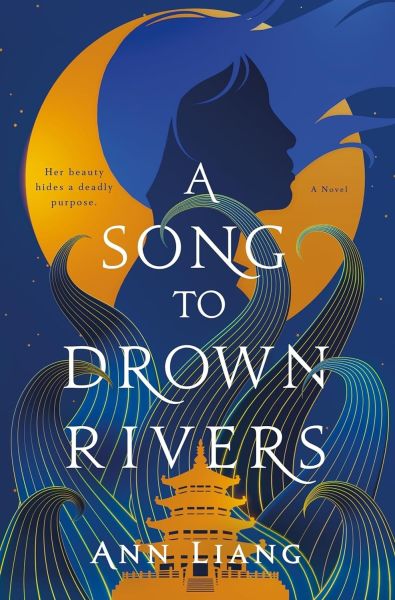Stop A While
A Song to Drown Rivers
By Ann Liang

6 Sep, 2024
Ann Liang’s 2024 A Song to Drown Rivers is a stand-alone historical novel.
Cruel Wu has subjugated noble Yue. Wu soldiers massacred the helpless people of Yue. Among the victims is Xishi’s beloved younger sister Susu. Xishi is filled with hatred towards the Wu.
Xishi is also a peerless beauty. Royal advisor Fanli believes Xishi’s beauty and her loathing of Wu will make Xishi into Yue’s greatest weapon.
But first! A word about the Spring and Autumn period.
Outsiders might find it very hard to tell Wu and Yue apart. Certainly, they are alike in their tendency to see the other as territory to be annexed. At present, the principal difference is that the armies of King Fuchai of Wu prevailed at Kuaiji, whereas the armies of King Goujian of Yue were defeated. Thus, Wu’s boot is on Yue’s neck and not the other way around.
On Fanli’s advice, Goujian submitted to Fuchai. Believing Goujian and Wu no longer a threat, Fuchai forgot his late father King Helü’s admonition to remain vigilant against the Yue at all costs. Instead, Fuchai engages in a life of debauchery.
Fanli’s plan is to offer Xishi as a bride to Fuchai. Once ensconced in Fuchai’s palace, all Xishi need to do is win Fuchai’s heart where his hundreds of concubines have failed. Then she can use her influence to whittle away at the Wu state. Once Wu has been sufficiently weakened, Yue will strike. Susu will be avenged.
The Xishi we first meet is no skilled dissembler. She will have to learn quickly. Once in the Wu court, she is surrounded by women as eager as she is to win Fuchai’s attention, women willing to kill pesky rivals. Additionally, Fuchai may believe that Yue is safely subjugated, but senior Wu advisors are not so sure. Xishi is a focus of suspicion.
It seems certain that even if Xishi can attract Fuchai’s attention, her only reward will be poison from an angry rival or a trumped-up charge from a court functionary. Will Susu go unavenged?
~oOo~
There is a very minor supernatural element in this book, but it is mostly a mundane historical novel. As such, knowledge of China’s Spring and Autumn period is something of a spoiler1. That said, there are several versions of the life of the real-life Xishi. Author Liang has considerable leeway here. No spoilers; all I will say is that Liang chose one version out of many.
The book is focused on Fuchai’s sexual excesses and not on his other activities, such as the successful war with Qi and various public engineering projects. Because Xishi is the viewpoint character, readers do get a front-row seat for Yue’s machinations in Wu’s court. In particular, bribing officials is quite efficacious, as is orchestrating the unjust execution of excessively canny court officials.
At one point, Fuchai makes the naïve mistake of accepting another character’s entreaties at face value. He did? He was that dumb? But that’s what history said he did. Indeed, suicidal naïveté is something of a running theme in the book2. Schemers seem incapable of grasping that they themselves might be targeted by other schemers.
Despite being a naïve country girl, Xishi turns out to be surprisingly adept at her assigned task. Now, there is a tendency on the part of some readers to dismiss competent women leads as “Mary Sues,” whereas they would accept without question a male lead of similar achievement. I’d point out to such readers that in this case, Xishi is one of the Four Great Beauties and remembered for a reason. History (or at least widely accepted folklore) credits her with all the successes related in the book. Nobody is going to write legends about a country beauty who was beheaded moments after being presented to the king she was told to seduce3.
While the novel isn’t exactly a feel-good tale of triumph over a cruel king (a narrative that Xishi would prefer), the book is engaging even for those who know how it plays out.
A Song to Drown Rivers is available here (Amazon US), here (Amazon Canada), here (Amazon UK), here (Apple Books), here (Barnes & Noble),here (Chapters-Indigo), and here (Words Worth Books).
1: One of the book’s more implausible details turned out to be as the annals recorded. Cue surprise.
2: Suicidal naïveté features in other Chinese epics I’ve read. Canny schemers somehow unable to see the target on their own head seems to be a recurring phenomenon in Chinese history.
3: Or have I forgotten a country beauty who was famously beheaded after being presented to a king? Feel free to remind me.
